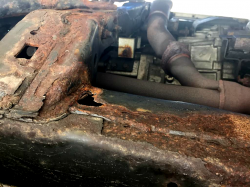
— A Toyota 4Runner frame rust lawsuit alleges corrosion is so excessive occupants are at risk due to the weakened frames.
The proposed Toyota class-action lawsuit includes 2005-2011 4Runners with frames manufactured by the Dana Holding Corporation.
South Carolina plaintiff Gary Weinreich says he purchased a new 2005 Toyota 4Runner Sport that had regular maintenance appointments between 2005 and 2017.
During a 2011 service appointment, the mechanic allegedly noted excessive rust on the undercarriage.
Then in a 2013 service visit the mechanic allegedly found severe rust on the shocks, exhaust and splash shields. According to the plaintiff, he was allegedly told the 4Runner was safe to drive even though corrosion was widespread.
In July 2017, the SUV was taken to a repair shop to have the rear brakes replaced and during the work the service manager allegedly said the frame had excessive corrosion. The lawsuit says the 4Runner owner was informed about a Toyota customer support program to replace rusted frames on Tacomas, Sequoias and Tundras.
However, the frame rust program didn't include 4Runners.
The plaintiff says he emailed Toyota about the rusted frame but didn't receive a response, so he sent another email that included photos of the 4Runner's rusted frame. But according to the plaintiff, Toyota offered no assistance and said repairs were the responsibility of the plaintiff.
In May 2018, the plaintiff was driving his car on the highway when the steering wheel allegedly started vibrating so violently the 4Runner went off the road. A mechanic said the right front control arm fractured because of excessive corrosion and rust.
The plaintiff says he filed a complaint with the National Highway Traffic Safety Administration (NHTSA) in May after Toyota allegedly refused to provide any assistance.
According to the 4Runner rust lawsuit, the frames on 2005-2011 models weren't prepared and treated properly to protect against excessive rust. The plaintiff says what he and other owners experience is far beyond typical surface rust and corrosion problems.
In addition, Toyota allegedly knows about the rust problems based on past actions taken on other Toyota models for the same corrosion issues.
In 2016, the automaker recalled about 690,000 model year 2005-2011 Tacoma trucks due to corroded suspensions, and that same year Toyota decided to settle a rust lawsuit for about $3.4 billion.
In the large class-action, 2005-2010 Tacomas, 2007-2008 Tundras and 2005-2008 Sequoia trucks had frames that didn't receive enough corrosion-resistant protection.
Toyota admitted the frame rust was "unrelated to and separate from normal surface rust which is commonly found on metallic surfaces after some years of usage.”
According to the 4Runner proposed class-action lawsuit, the SUVs suffer from the same lack of anti-rust protection as the trucks included in the 2016 settlement.
In place of official recalls, Toyota has allegedly offered service campaigns that weren't publicized, campaigns that allegedly provided inadequate repairs for only certain customers in limited areas of the country.
The plaintiff claims Toyota has deceived 4Runner drivers by not repairing all the SUVs, in effect making certain owners believe their vehicles are safe to drive.
The plaintiff also claims the frame rust goes undetected unless the vehicle undercarriage is specifically inspected or the suspension breaks.
In August 2018, NHTSA said it received a petition to investigate frame rust problems in 2002-2006 Toyota 4Runners by South Carolina petitioner Gary Weinreich, but to date the government hasn't announced if it will open an investigation.
The Toyota 4Runner frame rust lawsuit was filed in the U.S. District Court for the District of South Carolina, Charleston Division - Gary Weinreich, et al., v. Toyota Motor Sales, et al.
The plaintiff is represented by the Bell Legal Group.
CarComplaints.com has complaints about the SUVs named in the frame rust lawsuit.
Toyota 4Runner - 2005 / 2006 / 2007 / 2008 / 2009 / 2010 / 2011 / All model years




